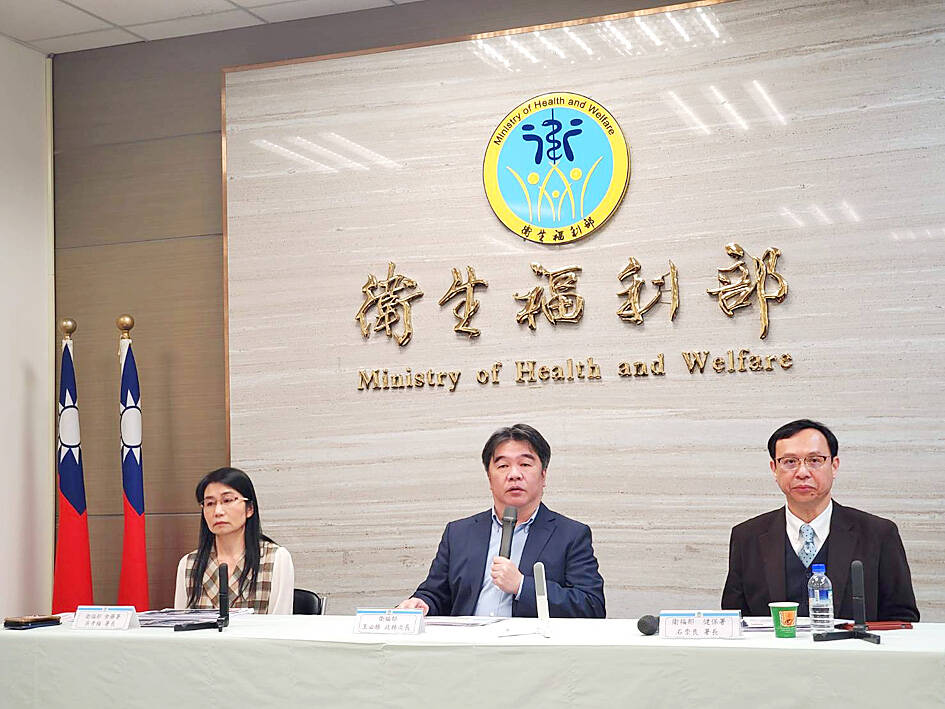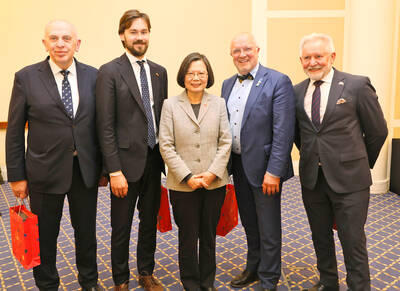The Ministry of Health and Welfare yesterday explained the main reasons for national drug shortages, and provided details regarding its short, medium and long-term strategies for handing the problem.
More than 14,000 types of drugs are included in the National Health Insurance system, with multiple reasons for some drug shortages, Deputy Minister of Health and Welfare Victor Wang (王必勝) said.
The primary reasons are connected to supply issues, including global drug shortages due to the COVID-19 pandemic, Russia’s invasion of Ukraine, shortages of drug ingredients and shipping delays, Wang said.

Photo: Lin Hui-chin, Taipei Times
As global demand increases and Taiwan is considered a small market by pharmaceutical companies, the quantity of imported drugs is likely to be affected, he said.
Another reason is “production issues,” including domestic drugmakers running low on raw materials, active ingredients and even workers, Wang said.
Clinical demand issues, such as an increase in demand for drugs for respiratory diseases during the winter, and long holidays also effect drug use, he said.
Other reasons include uneven distribution.
Hospitals are prioritized for drug deliveries, so the supply to local clinics and pharmacies often falls short, Wang said.
Many doctors are also accustomed to prescribing certain brands of drugs, despite having drugs of the same form, dosage and ingredients available, while higher prices also cause an issue, he added.
Wang said short-term solutions would be aimed at drugs that have no available alternative.
Negotiating with drug companies to increase production and quickly import new supplies, while evenly distributing drugs to healthcare facilities and hospitals would also be part of the ministry’s actions, Wang said.
The National Health Insurance Administration (NHIA) would also review and adjust its drug expenditure target (DET), he said.
Medium-term solutions include further adjusting the DET along with drug prices, establishing a permanent response center to monitor and deal with drug shortages faster, and setting up better communication channels with healthcare facilities and the public, Wang said.
Long-term solutions include re-evaluating the DET mechanism and drug price policies, encouraging and assisting drug companies in producing generic drugs, establishing a risk management mechanism and planning a national centralized procurement trial project, Wang said.
The Food and Drug Administration has established a drug supply information platform — dsms.fda.gov.tw — that allows healthcare providers and pharmacists to report shortages of drugs, he said.
NHIA Director-General Shih Chung-liang (石崇良) said that while many people are concerned that annual drug procurement price adjustments would make some drugs harder to obtain, the prices of drugs that are in short supply would not be adjusted.

Former president Tsai Ing-wen (蔡英文) on Monday called for greater cooperation between Taiwan, Lithuania and the EU to counter threats to information security, including attacks on undersea cables and other critical infrastructure. In a speech at Vilnius University in the Lithuanian capital, Tsai highlighted recent incidents in which vital undersea cables — essential for cross-border data transmission — were severed in the Taiwan Strait and the Baltic Sea over the past year. Taiwanese authorities suspect Chinese sabotage in the incidents near Taiwan’s waters, while EU leaders have said Russia is the likely culprit behind similar breaches in the Baltic. “Taiwan and our European

The Taipei District Court sentenced babysitters Liu Tsai-hsuan (劉彩萱) and Liu Jou-lin (劉若琳) to life and 18 years in prison respectively today for causing the death of a one-year-old boy in December 2023. The Taipei District Prosecutors’ Office said that Liu Tsai-hsuan was entrusted with the care of a one-year-old boy, nicknamed Kai Kai (剴剴), in August 2023 by the Child Welfare League Foundation. From Sept. 1 to Dec. 23 that year, she and her sister Liu Jou-lin allegedly committed acts of abuse against the boy, who was rushed to the hospital with severe injuries on Dec. 24, 2023, but did not

LIKE-MINDED COUNTRIES: Despite the threats from outside, Taiwan and Lithuania thrived and developed their economies, former president Tsai Ing-wen said Former president Tsai Ing-wen (蔡英文) on Saturday thanked Lithuania for its support of Taiwan, saying that both countries are united as partners in defending democracy. Speaking at a reception organized by the Lithuania-Taiwan Parliamentary Friendship Group welcoming her on her first visit to the Baltic state, Tsai said that while she was president from 2016 to last year, many Lithuanian “friends” visited Taiwan. “And I told myself I have to be here. I am very happy that I am here, a wonderful country and wonderful people,” Tsai said. Taiwan and Lithuania are in similar situations as both are neighbors to authoritarian countries, she

Taiwanese indie band Sunset Rollercoaster and South Korean outfit Hyukoh collectively received the most nominations at this year’s Golden Melody Awards, earning a total of seven nods from the jury on Wednesday. The bands collaborated on their 2024 album AAA, which received nominations for best band, best album producer, best album design and best vocal album recording. “Young Man,” a single from the album, earned nominations for song of the year and best music video, while another track, “Antenna,” also received a best music video nomination. Late Hong Kong-American singer Khalil Fong (方大同) was named the jury award winner for his 2024 album